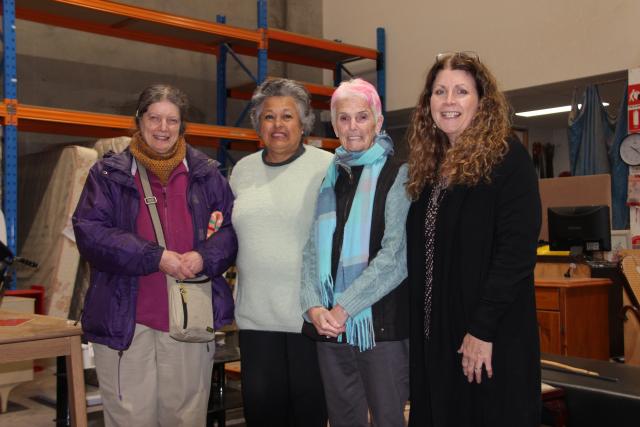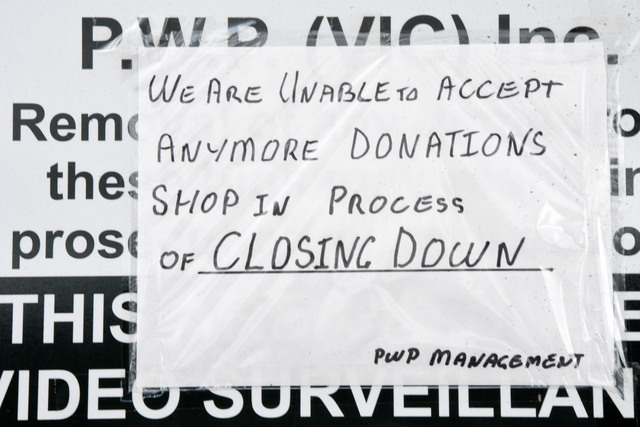By Callum Ludwig
A concerning rise in the number of community op shops having shut down or facing closure has arisen in the Yarra Ranges and beyond, despite op and thrift shopping becoming an ever more popular pastime.
Close to home, Anglicare’s Anglicare’s Treasure Chest Op Shop in Lilydale closed from 30 June 2023, the Tecoma PWP Op Shop closed in September 2023 before being revived by a passionate local from the Basin, the Coldstream Op Shop closed for two months from January this year before new owners were able to take the reins and the Golden Opportunity Shop in Wandin North is facing closure currently without someone new to look after it.
Declining volunteer numbers, ageing volunteer populations and rising operational costs have all been cited as reasons behind the struggles.
Associate Professor Craig Furneaux leads the team at the Australian Centre for Philanthropy and Nonprofit Studies (ACPNS) at Queensland University of Technology (QUT) which researches and teaches philanthropy, nonprofit and social enterprise skills to people across Australia.
Assoc Prof Furneaux said charity retail and op shops have been around for decades as a way for people in the community to give and for charities to channel revenue to important needs.
“The beneficiaries range from local to international causes and from animals to
environments to people. There are thousands of outlets and many more volunteers, and some paid staff in larger organisations,” he said.
“Op shops facilitate in-kind giving and that’s critical to Australian philanthropy, not everyone can or wants to give cash, or they might want to help in as many ways as they can so want to donate goods as well as cash to their favourite cause or community.”
In-kind giving is the act of donating or contributing something other than me and can take the form of voluntary labour like that of the volunteers of op shops or donated goods, such as the items given to and sold in op shops themselves.
The ACPNS was commissioned by the Australian Government in 2016 to conduct the ‘Giving Australia’ paper, considered to be the largest research effort into philanthropy in order ‘to understand how, why and how much Australians give to charity.’
In the research, the ACPNS heard from focus groups and in interviews that in-kind giving and goods-based donations were perceived to achieve ‘100 per cent potential benefit’ compared to cash donations where scepticism remained about how much money actually made it people in need and provided a way to give for those who couldn’t financially.
Assoc Prof Furneaux said op shops have always been important for people on tight funds, however they are also increasingly popular with people who purchase to resell or ‘flip’ items.
“The rise of the circular economy, with the mantra of ‘recycle, reuse, refurbish repurpose to reduce waste’, has raised the awareness of how to achieve more sustainable consumption,” he said.
“In this way, Op Shops greatly reduce environmental impact of goods which would otherwise just be sent to the local council tip. Vintage shopping and being able to affordably dress in style are also drivers here.”
Some larger organisations have also pulled out of or reduced the number of op shops they operate: Vision Australia pulled out of operating op shops in late 2019 into early 2020, Doncare has closed op shops at locations across the state since the beginning of the Covid-19 pandemic and Animal Aid last week had to close their Lakes Entrance location.
Assoc Prof Furneaux said that there’s a range of reasons why op shops may close.
“Some organisations have not fully recovered from the pandemic which affected face-to-face activities – such as volunteering – so there may be a lack of volunteers. Volunteers are often very enthusiastic but may lack the skills required to function effectively in a retail environment such as an op shop,” he said.
“The nature of volunteering itself is also shifting with the rise in episodic volunteering, rather than long term volunteering; and commitment to a cause, rather than to a single organisation. Additionally, while volunteers are not paid, they need to be recruited, trained, supported and supervised which is a cost the charity needs to meet,”
“Finally, not all donated goods are of a quality which can be re-sold, and there is a cost involved in ensuring items for sale are clean, functional and priced in a way which represents good value. Goods which don’t meet these criteria still need to be disposed of.”









